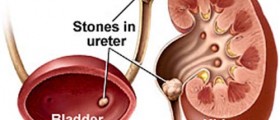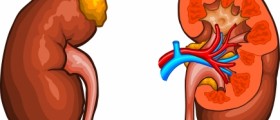
Kidney stones
A condition in which a person suffers from kidney stones is called nephrolithiasis, and stones in other parts of urinary tract are called urolithiasis.
Causes of kidney stones
Kidney stones occur as a result of decrease in urine volume and excess of substances that are able to form stones. It is usually calcium in combination with oxalate or phosphate. Alternatively, stones can form from uric acid or cystine, which is an amino acid.
Factors that may contribute or cause kidney stones are dehydration, obstruction to the urine flow and urinary tract infections. The latter cause stones that are called struvite or infection stones.
Generally, men are more prone to kidney stones than women. Also, they seem to affect more Caucasians than others. In men, kidney stones usually start in theyr forties and peak in their seventies.
Previous personal or family history of kidney stones is also considered to be a factor of risk.
Several medical conditions increase the risk of kidney stones. Those are gout, hyperparathyroidism, hypercalciuria, diabetes, hypertension and irritable bowel disease.
Medications that can increase the risk of kidney stones are diuretics, antacids that contain calcium and indinavir, a drug used for the HIV infection.
Symptoms of kidney stones
In women, the main symptom of a kidney stone is pain. The pain is usually located in the lower back, where the affected kidney is. The pain does not occur on both sides of lower back. Kidney stones may also cause a feeling similar to stomach cramping and tingling while urinating. Kidney stone may cause damage and small tears on the delicate membrane of the kidney so there may be other urinary tract problems. The urine may change in color and become blood-tinged, there may be a strong, foul smell and a frequent urge to urinate, even when there is not much urine to be expelled.
In some women, kidney stones may cause fever.
There are usually no clear early signs that there is a stone or several stones in the kidney. Fortunately, some stones are small enough to be passed unnoticed. However, those that are big enough can cause significant problems. Many women have testified that the pain a kidney stone causes is very intensive and excruciating.

















Your thoughts on this
Loading...